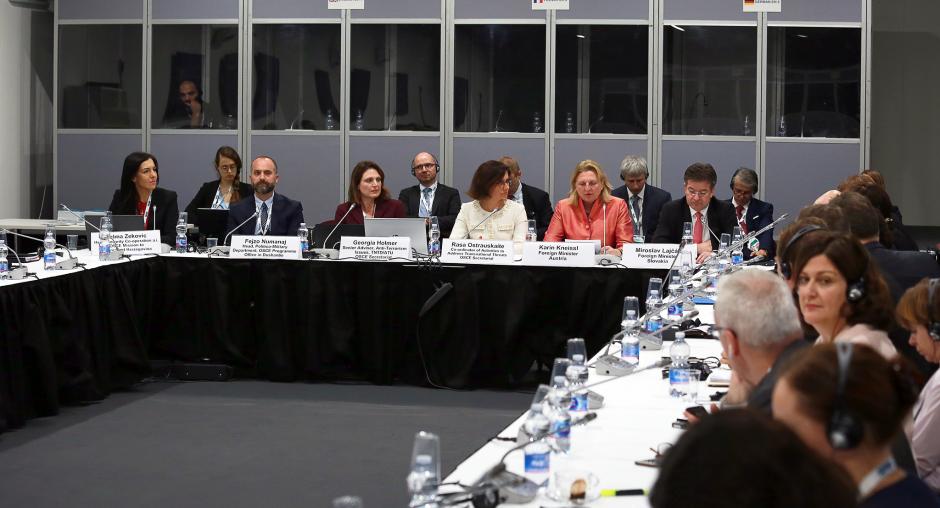Paving the way for preventing and countering VERLT in the OSCE region discussed at side event during OSCE Ministerial Council in Milan

Recent advances in the OSCE’s pioneering preventive work against violent extremism and terrorism (VERLT) was the topic of a side event at the 2018 OSCE Ministerial Council in Milan on Tuesday, 6 December 2018.
Speakers at the event were Austrian Foreign Minister Karin Kneissl, Slovak Foreign Minister Miroslav Lajčák and representatives of the OSCE Secretariat and field operations.
Foreign Minister Kneissl stressed the importance of taking a whole of society approach to countering VERLT. “No country is immune to this threat, and people who are radicalized are not necessarily the losers in our societies,” she said. “Human rights and rule of law have to be at the forefront of any strategy against VERLT.”
Foreign Minister Lajčák likened VERLT to a virus that attacks societies from within. This makes the preventive work of the OSCE all the more valuable, he said, citing the Organization’s convening power and the expertise of its Transnational Threats Department and field operations.
The work of the OSCE in preventing and countering VERLT has shifted in recent years from a policy agenda to a growing community of practice, said Georgia Holmer, Senior Adviser on Anti-terrorism Issues in the Action against Terrorism Unit (ATU) of the TNT Department. She noted an increase among participating States in political appetite to embrace preventive measures, the development of national action plans, the co-ordination of governmental and non-governmental actors and demand for OSCE support.
Holmer highlighted the OSCE’s Leaders against Intolerance and Violent Extremism (LIVE) Initiative, a comprehensive training and coaching programme for youth, women and community leaders designed to enable civil society actors to take action against VERLT. A regional LIVE train-the-trainers programme for Youth Leaders will be launched next week in South-Eastern Europe, she said.
She also introduced the audience to a series of technical guidebooks being developed by the ATU to address specific challenges in the implementation of P/C VERLT policies. The Role of Civil Society in Preventing and Countering VERLT was published this year and three further publications are scheduled for 2019.
Innovative practices
The work of two OSCE field operations in assisting their host countries with the prevention of VERLT were highlighted at the event. Fejzo Numanaj, Head of the Politico-Military Department at the OSCE Programme Office in Dushanbe, spoke about the support his Office provides to Tajikistan in the implementation of its national action plan against VERLT and the training courses it organizes for parents and teachers in communities throughout the country.
Numanaj stressed the usefulness of conducting gender-disaggregated analysis of the feedback received from the training, revealing different ways in which the dangers of VERLT affect mothers and fathers. Women typically cite the lack of adequate knowledge of the Internet, where much of the recruitment to violent extremism takes place, as well as labour migration to the Russian Federation, where their children are vulnerable to recruiters, as their top concerns, he said.
Selma Zekovic, Acting Head of Security Co-operation at the OSCE Mission to Bosnia and Herzegovina, outlined the Mission’s longstanding partnership with the BiH government in the fight against VERLT and its work in communities, including a project assisting over 1,000 Muslim imams in delivering counter narratives to violent extremism.
Young people are highly vulnerable to recruitment to radicalization; at the same time, they can offer unique insights from the perspective of their particular groups, Zekovic said. She presented a video documentary shot as part of an innovative project in which education students created a theatre play about the radicalization of a young woman. The students are performing the play in the hope that it will help others in similar situations to recognize the dangers of being drawn into violent extremist groups.
Effective prevention of VERLT requires sensitivity to the uniqueness of the local context, participants concluded during the discussion at the event. At the same time, sharing of ideas is important. The OSCE’s successful social media campaign #UnitedCVE, launched in 2016, serves as a platform for sharing ideas and reinforcing good initiatives across the OSCE region.
